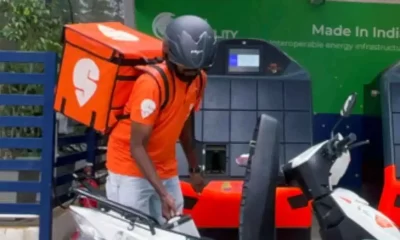India’s largest car manufacturer Maruti Suzuki India (MSI) today – Wednesday, Sep 4 – announced no-production days at Gurugram and Manesar plants on 7th September and 9th September 2019.
In a statement to stock exchanges, Maruti Suzuki India said it has decided to shut down the passenger vehicle manufacturing operations of Gurugram and Manesar plants in Haryana for two days, on 7th and 9th September, 2019. Both days will be observed as no production days.
The announcement comes days after the company announced a drastic 36 per cent drop in domestic passenger vehicle sales for the month of August. This came on the back of decline in sales over last several months.
The company has already cut its production for seven straight months including in August 2019.
Maruti accounts for more than half the share of India’s passenger car market.
Also Read: Justice for Madhav and Harsh: Social media came in support of the boys
The company produced a total of 1,11,370 units in August as against 1,68,725 units in the year-ago month. Passenger vehicles’ production last month stood at 1,10,214 units as against 1,66,161 units in August 2018, a decline of 33.67 per cent.
In July, the automaker had cut its production by 25.15 percent to 1,33,625 units.
On September 1, the company had reported a 33 per cent dip in total sales last month at 1,06,413 units as compared with 1,58,189 units in August 2018.
Today, Maruti Suzuki shares were trading 2.5% lower at Rs 5,900 in noon trade, reported LiveMint.
On Sunday, Maruti Suzuki reported a nearly one-third decline in sales at 1,06,413 units in August. The company had sold 1,58,189 units in August last year. Domestic sales declined by 34.3 per cent at 97,061 units last month as against 1,47,700 units in August 2018.
There was a nearly 72 per cent drop in sales of mini cars. Sales of mini cars comprising Alto and WagonR stood at 10,123 units as compared to 35,895 units in the same month last year, down 71.8 per cent.
Also Read: 5 US Governors to visit India over 2 Months to boost Ties
Sales of compact segment, including models such as Swift, Celerio, Ignis, Baleno and Dzire, fell 23.9 per cent at 54,274 units as against 71,364 cars in August last year.
Mid-sized sedan Ciaz sold 1,596 units as compared to 7,002 units earlier.
However, sales of utility vehicles, including Vitara Brezza, S-Cross and Ertiga, rose 3.1% at 18,522 units as compared to 17,971 in the year-ago month, MSI said.
Exports in August were also down by 10.8% at 9,352 units as against 10,489 units in the corresponding month last year, the company said.
























